Over the past few years, the consulting industry has changed a lot as more businesses turn to external experts for help with growth and innovation. All organizations, regardless of their size, now find it difficult to manage consultants effectively. With a strong Consultant Management System, operations become smoother, productivity grows and there is easy collaboration between workers and consultants.
Today’s businesses encounter different challenges with consultants such as following project progress, managing time, handling invoices and ensuring good communication. When systems are not in place, companies may face difficulties with disorganized information, failing to meet deadlines and exceeding their budgets. This guide introduces you to the 10 most effective consultant management software solutions that can greatly improve the way your business manages consultants, finishes projects and operates. They provide useful features that support making complicated tasks easier and ensure that the most is gained from partnering with consultants.
What is a Consultant Management System (CMS)?
A Consultant Management System is a type of software that is meant to make the whole process of working with consultants in an organization more efficient. With this solution, you can manage everything, including hiring consultants, overseeing projects and reviewing their outcomes. Project management, time tracking, allocating resources, messaging and handling finances are some of the system’s main features.
The main goal of a CMS is to take away the difficulties and mistakes that can happen when handling external consultants. It helps organize consultant data, monitor the project’s progress, allow easy communication and guarantee that contract requirements are met.
Most of these systems give easy access to live data on what consultants are doing, how the project timeline looks, how much money is used and what has been delivered. Some tools also integrate features found in Product Management Software, enabling better coordination between consultants and in-house teams for streamlined project delivery.
When organizations rely on a strong Consultant Management System, they can go from reactive to proactive management of consultants which leads to better results, healthy relationships and complete control over their consulting expenses.
Why Businesses Need a Consultant Management System
- Enhanced Project Visibility and Control: Organizations gain a complete picture of the consultants’ activities through real-time project tracking and milestone monitoring, enabling better decision-making and fostering proactive resolution of issues.
- Communication and Collaboration Flow Smoothly: Central channels of communication dissolve information silos while keeping concerned parties informed about project status, changes, and significant updates through to the life of the engagement.
- Cost Control and Budget Optimization: These advanced financial tracking features assist organizations in analyzing their expenditures, avoiding budget overruns, and optimizing resource allocation, while ensuring transparency with respect to consultant billing and expenses.
- Better Compliance and Risk Management: Automated workflows assure compliance with applicable regulations, contract terms, and internal policies while mitigating risks associated with consultant management and project delivery.
- Data-Driven Performance Analytics: Such extensive reporting and analytic capabilities allow insight into consultant performance, project success rates, and opportunities for improvement to further optimize consulting strategies.
- Operational Efficiency and Time Savings: Automation eliminates the traditional administrative burden of performing such tasks manually and rather passes workflows into the hands of those whose competencies are best suited for strategic activities rather than routine management activities.
Key Features of a Consultant Management System
- Comprehensive Project Management Tools: Advanced Gantt charts, milestone management, and resource allocation enable advanced project planning, scheduling, and tracking tools to keep projects on track and within scope.
- Time Tracking and Attendance Management: Time tracking and attendance, potentially with mobile access, automated timesheet generation, and approval workflows provide actual billing and productivity metrics.
- Financial Management and Billing Integration: Advanced invoicing, expense tracking, budget follow-up, and integration with accounting software guarantee financial transparency and control during consultant engagements.
- Document Management and Version Control: Centralized document repositories with version control, collaborative editing, and secure access control ensure that all stakeholders are working on the most updated information.
- Performance Analytics and Reporting: Customized dashboards, real-time reporting, and advanced analytics serve insights on consultant performance, project profitability, and operational efficiency metrics.
- Communication and Collaboration Tools: Integrated messaging, video-conferencing, and collaborative workspace tools enable hassle-free communication between internal teams and external consultants by the distance.
Top 10 Consultant Management System Software
1. Proposify
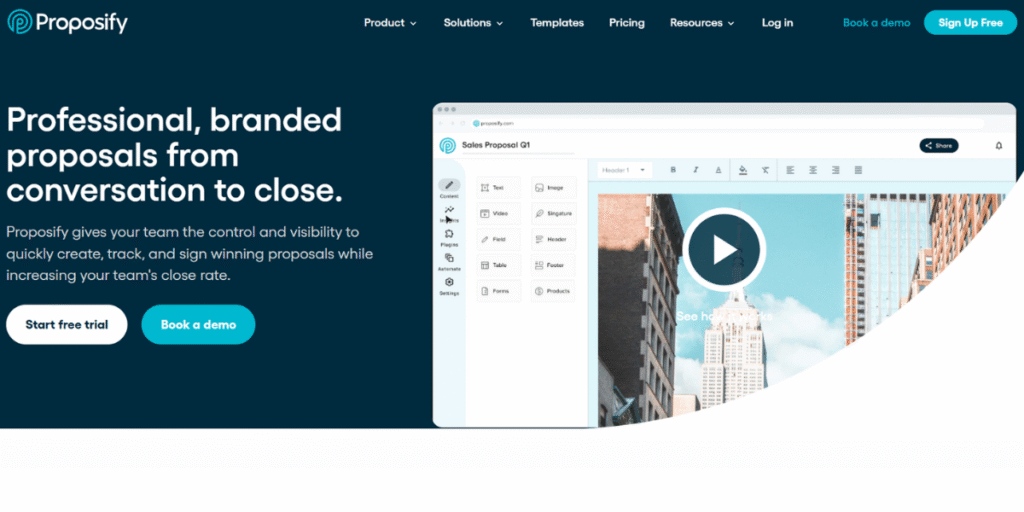
Proposify is a leading platform for managing proposals that improves the process of creating, delivering and monitoring professional proposals. This software takes care of all proposal tasks starting from a draft and going all the way to signing, making it very important for managing consultants. With this platform, businesses are supported by easy-to-use drag-and-drop editors, customizable templates and powerful analytics for faster and more efficient closing of sales.
It works well with well-known AI CRM tools and supplies users with real-time information on how their proposals are doing, so they can make improvements accordingly. With Proposify’s collaboration feature, team members have the tools to work together on the same proposal and all changes are kept in check with proper version management.
Key Features:
- Advanced proposal builder with customizable templates and branding options
- Real-time proposal tracking and engagement analytics
- Electronic signature integration for streamlined contract execution
- CRM integration with popular platforms like Salesforce and HubSpot
- Team collaboration tools with role-based permissions
- Automated follow-up sequences and proposal expiration reminders
Pros:
- User-friendly interface with minimal learning curve
- Comprehensive analytics and reporting capabilities
- Strong integration ecosystem with third-party applications
- Excellent customer support and onboarding assistance
Cons:
- Limited project management features beyond proposal creation
- Higher pricing tiers may be expensive for small businesses
- Some advanced features require technical expertise to implement
- Mobile app functionality could be more robust
Best for: Businesses focused on improving their proposal creation and client acquisition processes.
2. Avaza
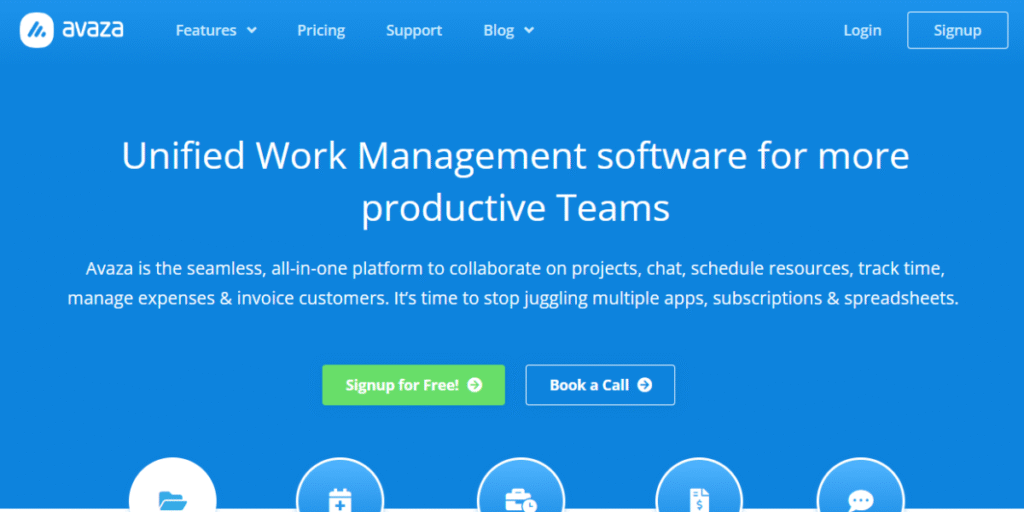
Avaza is designed to handle business management, bringing together project management, time tracking, expense management and making invoices in one place. The platform is flexible for consulting firms and companies working with consultants by giving them all the necessary tools to handle client matters and project execution. Since the interface is user-friendly, the software can be used by people of any technical experience.
The platform is excellent at giving detailed reports and dashboards that can be tailored to the user’s needs. Avaza’s tools allow team members to stay informed together during the project period and the platform supports proper management of money and cash flow.
Key Features:
- Integrated project management with task scheduling and milestone tracking
- Comprehensive time tracking with mobile app support
- Advanced invoicing and expense management system
- Team collaboration tools with file sharing capabilities
- Customizable reporting and analytics dashboard
- Client portal for transparent communication and project updates
Pros:
- Comprehensive feature set covering multiple business functions
- Competitive pricing with scalable plans
- Strong mobile application for on-the-go management
- Excellent integration with accounting software
Cons:
- Interface can become cluttered with extensive feature usage
- Learning curve for advanced features and customizations
- Limited customization options for reports and dashboards
- Some users report occasional performance issues with large datasets
Best for: Small to medium-sized consulting firms seeking an integrated business management solution.
3. Nifty
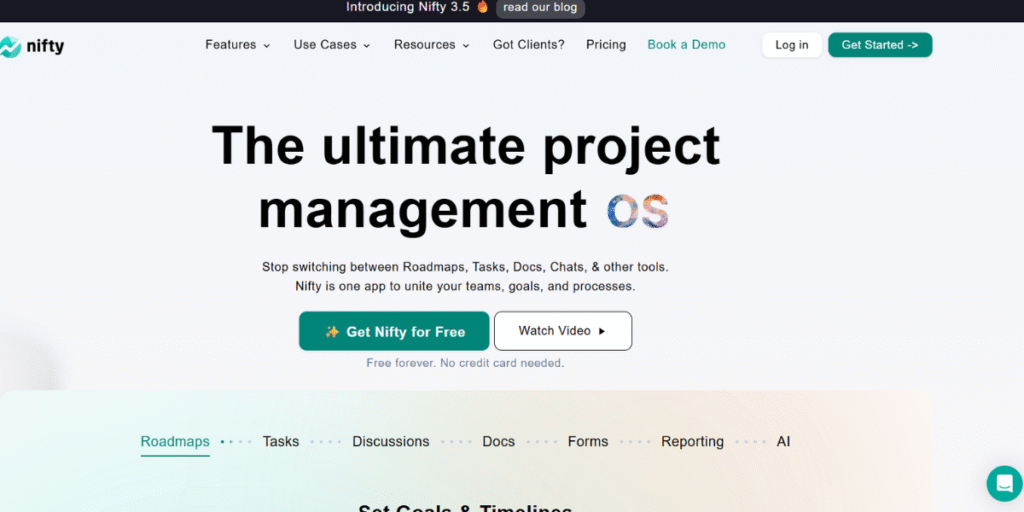
Nifty becomes a valuable option for managing teams and projects because it helps teams collaborate and handles project processes more efficiently. This new approach mixes traditional project management tools with modern ways to communicate, allowing teams and consultants to cooperate in one place. Keeping the project on track and deliverables finished on time is possible thanks to the platform’s focus on achievement of milestones.
The program’s power comes from showing all project details clearly and still being easy to use every day. Automation from Nifty means teams have more time to work on activities that help the project prosper.
Key Features:
- Milestone-based project management with visual progress tracking
- Integrated team chat and video conferencing capabilities
- Advanced time tracking with automated reporting
- Document management with version control and collaboration tools
- Customizable project templates and workflow automation
- Client collaboration portal with branded interface options
Pros:
- Clean, intuitive interface with excellent user experience
- Strong focus on team collaboration and communication
- Competitive pricing with generous feature inclusion
- Regular updates and new feature releases
Cons:
- Limited advanced reporting and analytics capabilities
- Fewer third-party integrations compared to competitors
- Some users desire more customization options
- Mobile app could benefit from additional functionality
Best for: Teams prioritizing collaboration and seeking a user-friendly project management solution.
4. Teamwork
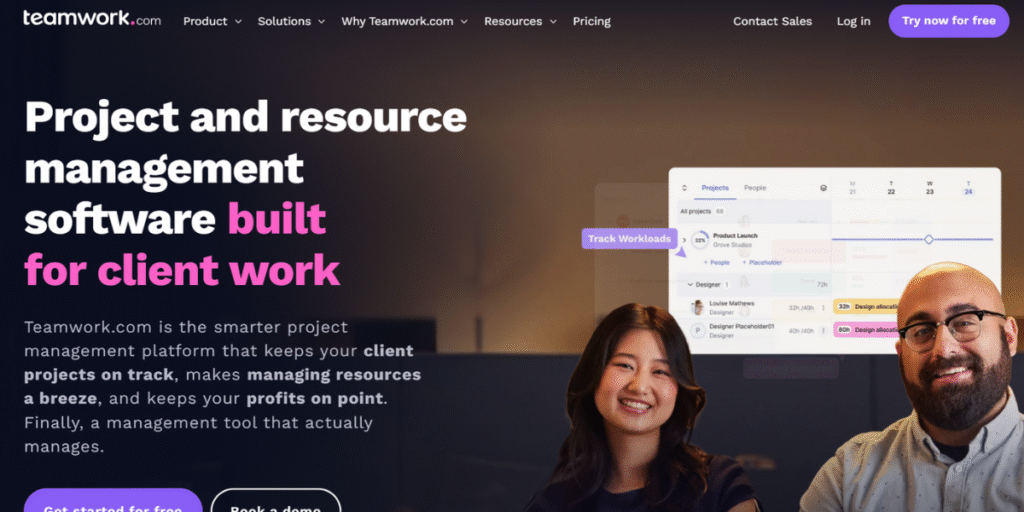
Teamwork offers an advanced and thorough platform for managing projects that is designed to support the demanding needs of businesses teaming up with consultants and outsiders. It gives you detailed tools for organizing projects, managing workforce and collaborating among team members and is flexible enough to fit different business models and project types.
The platform is valuable because it can adapt to any organization, from small ones to large enterprises. Thanks to effective reporting features, teamwork makes it easy for managers to see how the project is progressing, how team members are working and what resources are used, so they can act based on the data.
Key Features:
- Advanced project management with Gantt charts and dependency tracking
- Comprehensive resource management and capacity planning tools
- Integrated time tracking with detailed reporting capabilities
- Team collaboration features including messaging and file sharing
- Client access portal with customizable branding options
- Sophisticated invoicing and financial management tools
Pros:
- Extensive feature set suitable for complex project requirements
- Strong reporting and analytics capabilities
- Excellent customer support with comprehensive documentation
- Highly customizable interface and workflow options
Cons:
- Steeper learning curve due to extensive feature set
- Higher pricing compared to simpler alternatives
- Interface can feel overwhelming for new users
- Some advanced features require additional configuration
Best for: Established businesses requiring comprehensive project management capabilities with advanced reporting features.
5. Accelo
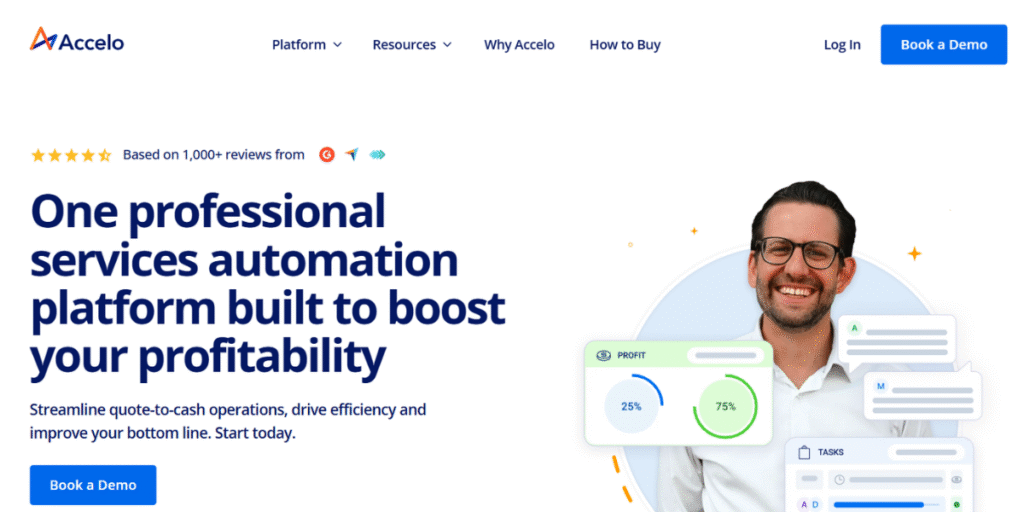
Accelo is a business automation platform, made for service-based companies that collaborate often with consultants and outside service providers. By combining features from CRM, project management and business intelligence, this solution helps manage both relationships with clients and the delivery of services in one place.
It performs well in handling repetitive tasks and offering deep insights into how the business is doing with its analytics and reporting tools. Since Accelo is built for service businesses, it is optimal for organizations with many consultants and projects.
Key Features:
- Integrated CRM with lead management and sales pipeline tracking
- Comprehensive project management with resource allocation tools
- Advanced business intelligence and performance analytics
- Automated workflow and process management capabilities
- Time tracking and expense management with mobile access
- Client portal with project visibility and communication tools
Pros:
- Powerful automation capabilities reducing manual work
- Comprehensive business intelligence and reporting features
- Strong focus on service-based business requirements
- Excellent integration with popular business applications
Cons:
- Complex setup and configuration process
- Higher learning curve for users unfamiliar with business automation
- Premium pricing may be prohibitive for smaller organizations
- Some users report occasional system performance issues
Best for: Service-based businesses seeking comprehensive automation and business intelligence capabilities.
6. Calendly
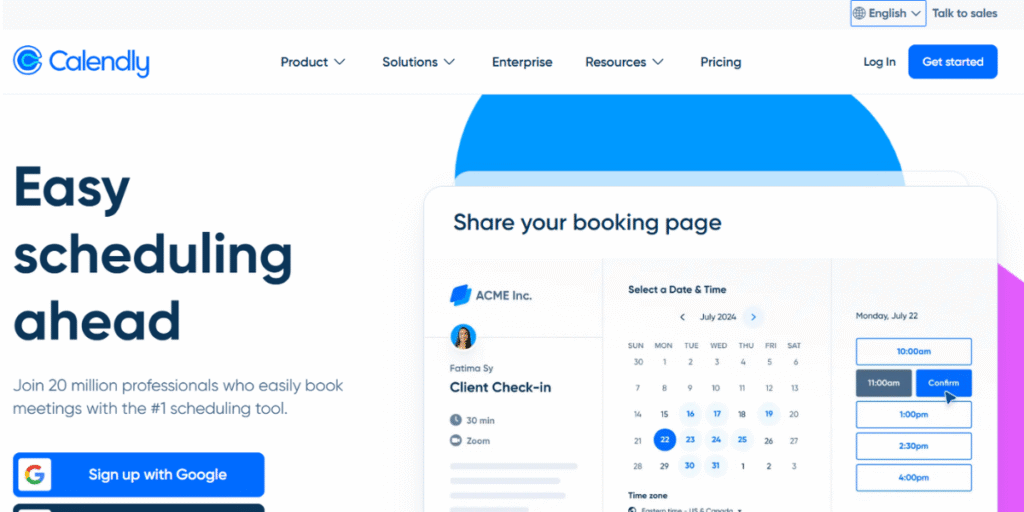
Calendly changes how people handle scheduling by allowing everyone involved to book meetings and consultations in a simple and fully automated way. Calendly is mostly used for scheduling, but its advanced options make it important for any Consultant Management System, especially those businesses that interact with clients and consultants a lot.
What makes the platform great is how easy and efficient it is at preventing back-and-forth scheduling talks. Calendly can be linked with various business tools which helps manage everyone’s schedules smoothly.
Key Features:
- Automated scheduling with customizable availability settings
- Integration with popular calendar applications and CRM systems
- Meeting preparation tools with agenda and document sharing
- Advanced scheduling rules and buffer time management
- Team scheduling capabilities with round-robin assignments
- Analytics and reporting for meeting patterns and efficiency metrics
Pros:
- Extremely user-friendly with minimal setup requirements
- Excellent integration ecosystem with business applications
- Significant time savings through scheduling automation
- Professional appearance enhances business credibility
Cons:
- Limited project management capabilities beyond scheduling
- Advanced features require higher-tier subscriptions
- Customization options are somewhat limited
- Not suitable as a standalone consultant management solution
Best for: Businesses prioritizing efficient scheduling and client interaction management.
7. Kantata
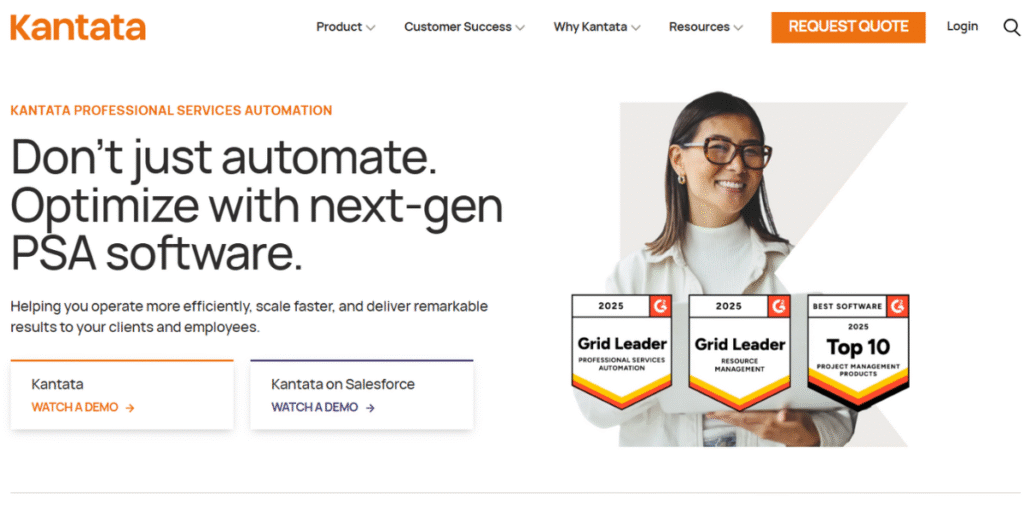
Kantata has a professional services automation tool designed for companies that depend on consultants and short-term projects. This solution offers everything needed to look after consultants from the start of their engagement until the end of the project and their performance review.
The advanced tools for resources and projects on the platform are especially helpful for companies managing a lot of consultants. Kantata’s emphasis on professional services means that all its features are based on consultant management best practices.
Key Features:
- Advanced resource planning and capacity management tools
- Comprehensive project accounting and financial management
- Sophisticated business intelligence and performance analytics
- Integrated time tracking with detailed reporting capabilities
- Client collaboration portal with project visibility tools
- Enterprise-level security and compliance features
Pros:
- Enterprise-grade features suitable for large organizations
- Comprehensive financial management and accounting integration
- Advanced analytics provide detailed business insights
- Strong focus on professional services requirements
Cons:
- Complex implementation process requiring significant planning
- Higher cost structure may not suit smaller businesses
- Steep learning curve for users new to professional services automation
- May be overly complex for simple consultant management needs
Best for: Large organizations requiring enterprise-level professional services automation capabilities.
8. Qwilr
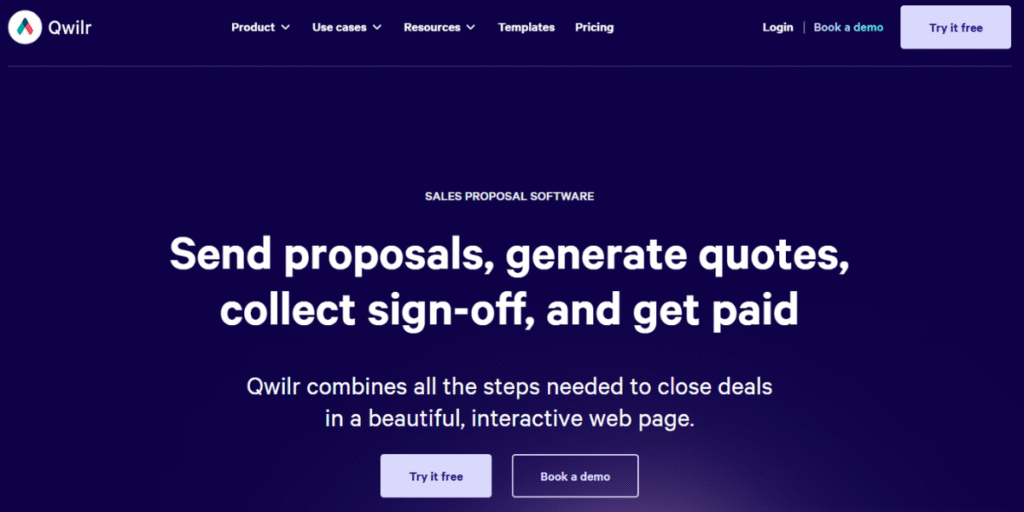
The process of creating proposals and presentations is improved with Qwilr which offers an innovative solution for interactive web-based documents. Qwilr’s new approach to document management helps consultants and makes it a valuable part of consultant management systems, especially for those who need to produce great proposals for clients.
With an eye on design and user interaction, the platform helps businesses get noticed in the industry and offers practical ways to monitor involvement and manage client exchanges during the proposal process.
Key Features:
- Interactive web-based document creation with multimedia support
- Advanced proposal tracking and engagement analytics
- Electronic signature integration for streamlined contract processing
- Template library with customizable branding options
- CRM integration for seamless workflow management
- Collaborative editing tools with team permission controls
Pros:
- Modern, visually appealing document presentation
- Comprehensive analytics provide valuable client insights
- User-friendly interface with minimal learning requirements
- Strong integration capabilities with business applications
Cons:
- Limited project management features beyond document creation
- Higher pricing for advanced features and customization
- May require adjustment period for teams used to traditional documents
- Mobile editing capabilities could be more robust
Best for: Businesses focusing on creating impressive, interactive client presentations and proposals.
9. Bidsketch

Bidsketch is a tool that simplifies the process of creating and handling proposals for companies that require speed and professionalism. This way of working is especially helpful for consultants because the quality and speed of creating proposals can influence the success of their business.
With a focus on proposal review and collecting feedback, the platform allows businesses to increase their chances of winning and decreases the effort needed to create project proposals and documentation.
Key Features:
- Professional proposal templates with customization options
- Proposal tracking and client engagement monitoring
- Electronic signature capabilities for contract finalization
- Client feedback collection and management tools
- Team collaboration features with approval workflows
- Integration with popular CRM and business applications
Pros:
- Focused feature set optimized for proposal creation
- Quick setup and implementation process
- Competitive pricing with good value proposition
- Strong customer support and user community
Cons:
- Limited functionality beyond proposal management
- Fewer customization options compared to comprehensive platforms
- May not suit businesses requiring extensive project management features
- Integration ecosystem is more limited than larger platforms
Best for: Businesses prioritizing efficient proposal creation and client acquisition processes.
10. ClickUp
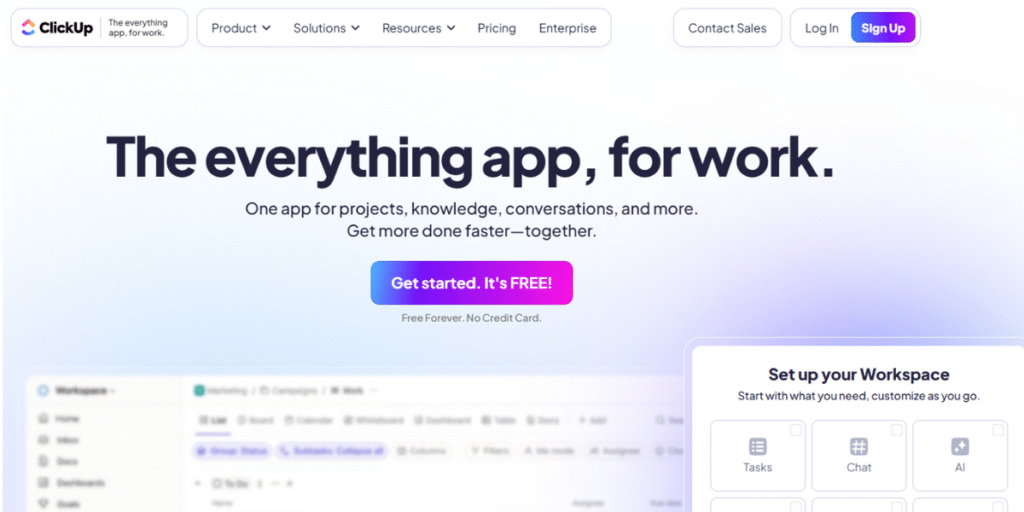
With ClickUp, you can manage your projects, collaborate with your team and boost productivity, all from one platform. It is versatile and can support a variety of business requirements and consultant management needs, as well as grow as an organization expands.
With so many customization options and numerous features, the software helps businesses design reliable consultant management processes that suit their exact needs and procedures.
Key Features:
- Comprehensive project management with multiple view options
- Advanced task automation and workflow customization
- Integrated time tracking with detailed productivity analytics
- Team collaboration tools including chat, comments, and file sharing
- Customizable dashboards and reporting capabilities
- Extensive integration library with popular business applications
Pros:
- Highly customizable interface and workflow options
- Comprehensive feature set suitable for various business needs
- Competitive pricing with generous free tier offerings
- Regular feature updates and platform improvements
Cons:
- Can be overwhelming for users seeking simple solutions
- Performance may slow with extensive customization and large datasets
- Learning curve for advanced features and customization options
- Some users report occasional bugs with new feature releases
Best for: Businesses seeking a highly customizable, all-in-one workspace solution for consultant and project management.
Benefits of Using a Consultant Management System
- Improved Operational Efficiency and Productivity: Workflow automation, simplified processes, and decreased administrative burden allow teams to concentrate on high value, strategic business activities and consultant relationship success, unlocking remarkable operational efficiency for the organization.
- Enhanced Financial Control and Budget Management: Real-time monitoring of consultant expenditure, budget consumption, and project profitability, aids informed financial decision making while eliminating cost overruns and optimizing return on investment spent on consultants.
- Superior Project Visibility and Accountability: Unmatched oversight of consultants’ work, project milestones, and deliverables is accomplished through robust tracking and reporting features, enabling comprehensive project management as well as proactive resolution of problems that may negatively influence project outcomes.
- Strengthened Compliance And Risk Management: Automated compliance monitoring and documentation systems aid in effective consultant and project delivery process maintenance of various types of contracts reducing compliance risks and improving overall consultant management.
- Data-Driven Decision Making and Performance Optimization: With sophisticated analytics and reporting tools in place, functionalities can be measured with insights into consultant performances, success rates of various projects, and other operational issues on an evidentiary basis that seeks to improve consultant management strategies over time.
- Increased Communication and Stakeholder Satisfaction: Centralized communication platforms kickoff or lift this capacity, providing client engagement portals for internal teams, consultations with stakeholders, facilitating internal alignment for project success-all standing the strongest relationships on each engagement’s life cycle.
How a Consultant Management System Works
- Initial Setup and Configuration Process: The system needs to be set up and configured properly which involves managing users, setting up permissions, designing workflows and ensuring it works smoothly with current business applications.
- Consultant Onboarding and Profile Management: New consultants are brought into the system step by step so their details are captured, they get access to the tools they need, their roles are determined and all policies and security rules are followed.
- Project Creation and Assignment Workflows: The project creation and assignment workflows follow standard procedures, recording the scope, required timelines, what is to be delivered and the resources needed and assigning the project to the most suitable consultants.
- Real-Time Monitoring and Progress Tracking:The system constantly tracks the progress of the project, marks the achievement of milestones, assesses project metrics and keeps stakeholders updated with real-time information on custom dashboards or automated updates.
- Financial Management and Invoice Processing: Time tracking, expense reporting, invoice creation and payment processing are all integrated into the financial tools which also maintain correct records for accounting and compliance during every stage of the consultant’s engagement.
- Performance Analysis and Reporting Generation: With advanced analytics, data from projects is used to create reports that highlight how consultants work, what the project results are, how budgets are utilized and the effectiveness of operations, helping in planning and continuous growth.
Things to Consider When Choosing a Consultant Management System
- Scalability and Growth Accommodation Capabilities: Verify if the solution can fit your organization’s growth plan, increase the number of consultants and projects, and evolve with changing business needs without a complete replacement or major restructuring of the system.
- Integration Compatibility with Existing Systems: Check if the platform will integrate well with your existing technologies, such as your CRM system, accounting software, communication tools, and other business applications, so that your workflow will continue undisturbed and data remain consistent.
- User Experience and Adoption Considerations: Please evaluate the ease of use of the platform, its learning curve requirements, and interface design so that it will be readily adopted by most team members and consultants, with relatively minimal training time and resistance to change.
- Security Features and Compliance Requirements: Assess the integrity of the security system, data protection capabilities of the system, certification, and accreditation for meeting regulatory requirements for your industry so it can secure sensitive consultant and project information.
- Cost Structure and Return on Investment Analysis: Consider evaluating the cost of ownership from the beginning with subscription fees and continuing with implementation fees, training, and maintenance. On the other hand, assessing the return on investment through greater efficiency and cost savings.
Conclusion
Implementing the correct Consultant Management System in the modern business environment can significantly improve how companies work with their outside consultants. Throughout this analysis, we have talked about different solutions, starting with easy-to-use Calendly and ending with the multi-functional Kantata.
To manage consultants successfully, you need to pick a system that fits your company’s needs, how it grows and how complex its operations are. If you are a small business looking for simple proposal tools, like Bidsketch or Qwilr or a large company requiring professional services automation such as from Accelo or Teamwork, a suitable Consultant Management System will bring about improvements in efficiency, managing costs and completing projects.
Since companies are using more external help and consultants, strong management systems will become even more important. Each of the consultant management platforms mentioned here is the best in its class, offering important benefits and services. If you compare your requirements with what the solutions provide, you can make a sound choice that will support your consultant management and lead to better business achievements in the future.
FAQs
How much is it on average to introduce a Consultant Management System
Depending on which system you use and how big your company is, the costs can be anywhere from $10 to $50 per user for basic platforms and over $100 per user for bigger systems.
How much time is usually needed to introduce a new Consultant Management System?
Simple solutions can be implemented within 2-4 weeks and complex enterprise systems might take from 3-6 months depending on their level of customization and how well they fit with other systems.
Are these solutions able to work together with what we currently use for CRM and accounting?
You can find that most Consultant Management Systems support the connection with popular Customer Relationship Management (CRM) systems and accounting software, including Salesforce and QuickBooks or Xero.
Which security features must a Consultant Management System have?
The main security measures are data encryption, verifying user access, controlling access by roles, regularly checking security and following standards such as SOC 2 and GDPR.
What factors should I consider to know how much a Consultant Management System is worth?
ROI is often found in improved delivery times for projects, lower administrative costs, better management of budgets, more use of consultants and happier clients.
